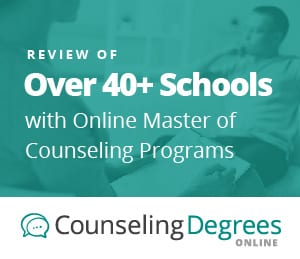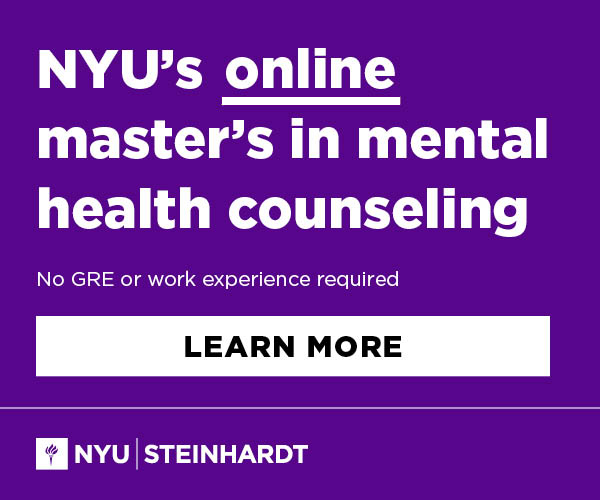 Northwestern University : Online MA in Counseling (CACREP Accredited)
Northwestern University : Online MA in Counseling (CACREP Accredited) Northwestern University : Master of Science in Marriage and Family Therapy (Complete your COAMFTE-accredited MFT online program in as few as 21 months. No GRE required.)
Northwestern University : Master of Science in Marriage and Family Therapy (Complete your COAMFTE-accredited MFT online program in as few as 21 months. No GRE required.) Walden University : MS in School Counseling (CACREP Accredited)
Walden University : MS in School Counseling (CACREP Accredited) Walden University : MS in Clinical Mental Health Counseling (CACREP Accredited, six specializations to choose from)
Walden University : MS in Clinical Mental Health Counseling (CACREP Accredited, six specializations to choose from) Grand Canyon University : Master's Degree in Counseling (As a private university, GCU has the same in-state and out-of-state tuition.)
Grand Canyon University : Master's Degree in Counseling (As a private university, GCU has the same in-state and out-of-state tuition.) Liberty University : MA: Clinical Mental Health Counseling (CACREP Accredited) (Online with required intensives)
Liberty University : MA: Clinical Mental Health Counseling (CACREP Accredited) (Online with required intensives) Mid-America Christian University (MACU) : Master of Science (MS) in Counseling (100% Online, No GRE Required)
Mid-America Christian University (MACU) : Master of Science (MS) in Counseling (100% Online, No GRE Required) Southern New Hampshire University (SNHU) : Online Psychology Degrees (Bachelors and Masters. Flexible. Affordable. And achievable.)
Southern New Hampshire University (SNHU) : Online Psychology Degrees (Bachelors and Masters. Flexible. Affordable. And achievable.) The Chicago School : M.A. in Clinical Mental Health Counseling (Online Programs. CACREP Accredited.)
The Chicago School : M.A. in Clinical Mental Health Counseling (Online Programs. CACREP Accredited.)The need for therapists is more prevalent than ever, as seasoned professionals continue to retire or leave the field for something new. If you have an interest in this particular career path, you may be wondering how to become a therapist.
The most typical course of action for aspiring therapists is to first acquire a bachelor’s degree, followed by a master’s degree and possibly a doctoral degree, before applying for licensure within their state of residence. This allows aspiring therapists to explore many careers, including mental health counseling, marriage and family therapy, and therapy in private practice.
People in the mental health field are clinically adept, empathic, and have excellent active listening and communication skills. It is also worth noting that therapists can often have overlapping responsibilities between roles, jobs, and intervention types. As such, as WebMD points out, therapy terms are sometimes used interchangeably, however it’s important to know the difference. Psychologists, who typically hold a Doctorate degree, can be therapists, but the reverse is not always true. Furthermore, different fields of therapy - like cognitive behavioral therapy or dialectical behavioral therapy - can be applied to various situations, helping people overcome a variety of mental health or substance abuse issues.
Different Types of Therapists and How to Become Them
Therapy is not a one-size-fits-all model. Indeed, there are many different types of mental health professionals. Therapists have various licensure requirements they must fulfill in order to practice in the field. As a result, there are several ways to enter the therapy field.
Marriage and Family Counselors
Becoming a licensed marriage and family therapist (LMFT) means that you will work with families, couples, and children, helping them manage a variety of relationship problems. To become an LMFT, a person will need a master’s degree, an average of two years of supervised post-graduate work, and a passing score on the licensure exam used in their state of residence.
Social Workers
Clinical social workers do not have to work for a social work agency, however, this is a common career path for many. Many social workers can work directly with patients in a group or private practice to address a variety of mental health issues or addictions.
The requirements vary from state to state. However, prerequisites usually involve obtaining a master’s degree in social work, post-graduate supervised clinical work, licensing exams, and continuing education after obtaining a license For example, in New York, a person must earn a Master of Social Work, complete the required training, apply for a social work license, and complete three years of supervised experience.
The requirements vary from state to state. However, prerequisites usually involve educational attainment, clinical work, licensing exams, and clinical hours. For example, in New York, a person must earn a Master of Social Work, complete required training, apply for a social work license, and complete three years of supervised experience.
Clinical Psychologists
A clinical psychologist is someone who is formally trained to provide a variety of mental health interventions, evaluations, research, and therapies. Clinical Psychologists typically need to obtain a Doctorate degree in psychology, and must also obtain a certain number of supervised hours post-graduation, earn a passing score on their state’s licensure exam, and maintain continuing education credits after obtaining their license.
Clinical Psychologists use different modalities to help patients achieve remission or recovery from a variety of behavioral or emotional disorders, including substance abuse, depression, and anxiety. Furthermore, someone who practices clinical psychology can work in private practice, group practice, hospitals, agencies, non-profits, or schools, among other options.
Behavioral Therapist
Behavioral therapists focus on modifying harmful behaviors and promoting positive ones, often using techniques like Cognitive Behavioral Therapy (CBT). To become a behavioral therapist, one typically needs a master's degree in psychology, counseling, or a related field, along with supervised clinical experience.
Child Therapist
Child therapists specialize in working with children and adolescents, addressing issues like anxiety, depression, and behavioral problems. A master’s degree in child psychology or counseling, along with specific training in child and adolescent development, is usually required.
Teletherapy
Teletherapists provide therapy services via telecommunication technologies, such as video conferencing. Becoming a teletherapist requires the same education and licensure as traditional in-person therapists, but with additional training or certification in telehealth services.
Therapist vs. Counselor
Therapist
Therapists, often referred to as psychotherapists, typically work with clients to diagnose and treat mental and emotional disorders. They may employ a variety of therapeutic techniques and often focus on longer-term treatment plans. Therapists usually have a master’s or doctoral degree in psychology, social work, or a related field, and are required to be licensed in the state where they practice.
Counselor
Counselors also address mental and emotional issues but tend to focus more on specific problems or life changes. They may work in schools, hospitals, or private practice, offering guidance and support. Counselors often have a master’s degree in counseling or a related field and must meet state licensure requirements. The scope of their practice can be broader, including career, school, family, and marriage counseling.
Therapist vs. Psychologist
Therapist
Therapists, also known as psychotherapists, focus on treating emotional and mental disorders through various therapeutic techniques. They work with individuals, groups, or families to improve mental health and well-being. Therapists typically hold a master’s degree in psychology, counseling, or a related field, and they are licensed to practice therapy.
Psychologist
Psychologists have a doctoral degree (Ph.D. or Psy.D.) and are trained in psychological testing, research, and advanced treatment methods. They can diagnose and treat a wide range of mental health issues and may specialize in areas like clinical, counseling, or developmental psychology. Psychologists often conduct research or teach in addition to practicing therapy.
Consider a Featured Online Counseling Program
| School and Program Information | Online Program? Entry Requirements |
Course Information |
|---|---|---|
| Northwestern University
Online MA in Counseling
 CACREP Accredited CACREP Accredited |
✔ Online
GRE Not Required Bachelor's Required |
Prepare to pursue licensure in as few as 18 months Learn MoreFull-time, part-time, and accelerated track options available |
| Northwestern University
Master of Science in Marriage and Family Therapy
COAMFTE Accredited |
✔ Online
GRE Not Required Bachelor's Required |
The COAMFTE-accredited MFT@Northwestern is offered by The Family Institute at Northwestern University. Full-time students can complete the program in as few as 21 months. No GRE is required, but applicants must hold an undergraduate degree. Full and part-time tracks available. Learn More |
| Walden University
MS in School Counseling
 CACREP Accredited CACREP Accredited |
✔ Online
GRE scores not required |
School counselors help students overcome obstacles and shape successful futures. Walden’s online MS in School Counseling program will give you a solid foundation in school counseling theories, approaches, and best practices while enabling you to gain hands-on experience. Learn More |
| Walden University
MS in Clinical Mental Health Counseling
 CACREP Accredited CACREP Accredited |
✔ Online
GRE scores not required |
Mental health counselors play a valuable role in helping people cope with life’s challenges. Walden’s online MS in Clinical Mental Health Counseling program can help you become the competent, compassionate counselor you know you can be. Learn More |
| Grand Canyon University
Master's Degree in Counseling
HLC and NASAC Accredited |
✔ Online
|
Clinical Mental Health Counseling master's degree emphases include: Childhood and Adolescence Disorders, Christian Counseling, Marriage and Family Therapy, and Trauma. Designed to meet the academic requirements of the National Board for Certified Counselors for the National Certified Counselor credential, the Certified Clinical Mental Health Counselor credential and the Arizona Board of Behavioral Health Examiners. As a private university, GCU has the same in-state and out-of-state tuition. Learn More |
| Liberty University
MA: Clinical Mental Health Counseling (CACREP Accredited)
 CACREP Accredited CACREP Accredited |
✔ Online
Online with required intensives |
Our CACREP-accredited master’s in counseling degree online can help you become an ethical, well-trained mental health counselor with the knowledge, values, and skills you need to empower others to make positive changes in their lives. Online and on campus. Training Champions for Christ since 1971. Learn More |
| Mid-America Christian University (MACU)
Master of Science (MS) in Counseling
Higher Learning Commission (HLC) |
✔ Online
100% Online |
Expand your impact with an online counseling degree rooted in faith-based practice. Mid-America Christian University offers the largest Master of Science (MS) in Counseling program in Oklahoma, with emphasis areas in addiction and substance abuse, applied behavioral science, clinical mental health counseling, and marriage and family therapy. Explore the online MS in Counseling at MACU. Learn More |
| Southern New Hampshire University (SNHU)
Online Psychology Degrees
Bachelors and Masters NECHE Accredited |
✔ Online
No application fee or GRE/GMAT scores required |
With our unique programs - from child and adolescent development to forensic psychology - you'll be prepared for a wide variety of careers in case management, research, human resources, youth services and social services. Learn More |
| The Chicago School
M.A. in Clinical Mental Health Counseling
 CACREP Accredited CACREP Accredited |
✔ Online
Bachelor's Degree Required. |
This online CMHC program prepares students for a career offering mental health services in a variety of settings; helping diverse clients through issues such as depression, anxiety, grief, low self-esteem, stress, relationship difficulties, and suicidal impulses. Learn More |
*Sponsored Counseling Programs
Online CACREP Accredited programs | Online MPCAC Accredited programs
 Northwestern University - Online MA in Counseling (CACREP Accredited)
Northwestern University - Online MA in Counseling (CACREP Accredited)
 Northwestern University - Master of Science in Marriage and Family Therapy (COAMFTE Accredited)
Northwestern University - Master of Science in Marriage and Family Therapy (COAMFTE Accredited)
 Walden University - MS in School Counseling (CACREP Accredited)
Walden University - MS in School Counseling (CACREP Accredited)
 Walden University - MS in Clinical Mental Health Counseling (CACREP Accredited)
Walden University - MS in Clinical Mental Health Counseling (CACREP Accredited)
 Grand Canyon University - Master's Degree in Counseling (NASAC Accredited)
Grand Canyon University - Master's Degree in Counseling (NASAC Accredited)
 Liberty University - MA: Clinical Mental Health Counseling (CACREP Accredited) (CACREP Accredited)
Liberty University - MA: Clinical Mental Health Counseling (CACREP Accredited) (CACREP Accredited)
 Mid-America Christian University (MACU) - Master of Science (MS) in Counseling (Higher Learning Commission (HLC) Accredited)
Mid-America Christian University (MACU) - Master of Science (MS) in Counseling (Higher Learning Commission (HLC) Accredited)
 Southern New Hampshire University (SNHU) - Online Psychology Degrees (NECHE Accredited)
Southern New Hampshire University (SNHU) - Online Psychology Degrees (NECHE Accredited)
 The Chicago School - M.A. in Clinical Mental Health Counseling (CACREP Accredited)
The Chicago School - M.A. in Clinical Mental Health Counseling (CACREP Accredited)
How to Become a Therapist Online
For many people, taking face-to-face courses doesn’t work with their busy schedule. Fortunately, when it comes to the training and education required to become a therapist, there are many online options. Depending on the robustness of these programs, you may be able to earn a bachelor’s, master’s, or doctoral degree fully online. A well-structured bachelor’s or master’s program should be able to help you find internship opportunities, fulfill licensure requirements, and gain the necessary clinical experience to work in the field.
According to Megan Kelly, MA, LMHC, “online counseling degrees are an increasingly popular and more widely-accepted path for aspiring therapists than ever before. The options for pathways into the therapy field continue to open for students from all backgrounds, which is beneficial for the field as a whole.” For working professionals or individuals with outside obligations, such as caring for family or involvement with their community, an online degree offers a great deal of flexibility. However, just as in traditional programs, students must follow the proper steps to ensure that they are fully prepared for a career in therapy.
1. Choose a Type of Therapy
Establishing the type of therapy you’re interested in practicing is an essential first step before applying to degree programs. Possible career options include:
- Clinical mental health counseling
- Marriage and family therapy
- Social work
- Alcohol and drug counseling
Selecting the best fit requires reflecting on personal interests and goals. For example, students who hope to help both children and adults with issues within their relationships may want to pursue a path toward offering marriage and family therapy.
2. Graduate from an Appropriate Degree Program
No matter what type of therapist you’d like to be, it is helpful—but often not required—to graduate from a relevant bachelor’s program. Many future therapists complete a bachelor’s in psychology or sociology. There are many colleges and universities that offer online degree programs in these areas.
Additionally, a master’s degree is almost always a requirement that must be met before someone can be licensed as a therapist. Popular master’s degree options for future therapists include a master’s in counseling, a master’s in psychology, and a master’s in child psychology and development, all of which can potentially be completed online.
3. Complete Required Clinical Experience
Another key requirement for licensure is clinical experience. Before they can become licensed, graduates of master’s degree programs must first complete a number of clinical hours under the supervision of a qualified professional. The number of hours required differs by state and specialization. There may also be specific criteria for how many hours must be spent in face-to-face interactions with clients.
4. Take a Licensure Exam
- Licensed Clinical Mental Health Counselor (LCMHC)
- Licensed Marriage And Family Therapist (LMFT)
- Licensed Independent Clinical Social Worker (LICSW)
- Licensed Professional Counselor (LPC)
- Licensed Clinical Professional Counselor (LCPC)
- Licensed Clinical Addiction Counselor (LCAC)
Some degree programs may be tailored to help students prepare for a particular type of licensure.
5. Take a Jurisprudence Exam
In some states, therapists and counselors must also take a jurisprudence exam to become licensed. This test differs from the licensure exam in that it focuses specifically on state laws and regulations related to the practice of therapy, social work, or counseling.
Career Outlook for Therapists
The career prospects for therapists in various specializations are diverse and growing. Here’s an updated overview based on information from the U.S. Bureau of Labor Statistics’ Occupational Outlook Handbook:
- Marriage and Family Therapists: In May 2022, the median annual wage was $56,570, with the field expected to grow 15% from 2022 to 2032, much faster than the average for all occupations.
- Rehabilitation Counselors: The median annual wage for rehabilitation counselors was $39,990 as of May 2022. The employment in this field is projected to grow 2% from 2022 to 2032, as fast as the average for all occupations.
- School and Career Counselors and Advisors: With a median annual wage of $60,140 as of May 2022, this sector is expected to see a 5% growth from 2022 to 2032, faster than the average for all occupations.
- Social Workers: In May 2022, social workers earned a median annual wage of $55,350. The job outlook for social workers is projected to grow 7% from 2022 to 2032, faster than average.
- Substance Abuse, Behavioral Disorder, and Mental Health Counselors: The median annual wage for this group was $49,710 in May 2022. The employment in these fields is expected to grow 18% from 2022 to 2032, much faster than the average for all occupations.
These statistics indicate robust growth and favorable prospects across various therapy specializations, reflecting the increasing demand for mental health and relationship-focused services in contemporary society.
College Majors to Be a Therapist
Fortunately, a variety of potential bachelor-level degrees can help someone along their path to becoming a therapist. Aspiring therapists should also keep in mind that a graduate degree is necessary for most therapy careers. As such, a college major is only the start of learning how to become a therapist. Relevant graduate programs are also necessary.
Psychology
A major in psychology is extremely common for many professional counselors or people who go into clinical psychology. Psychology is the study of the human mind. It examines how the mind works and a variety of mental illnesses. This is one of the most common degrees for mental health professionals.
Sociology
Sociology involves the study of individual relationships between people, large institutions, or society at large. It is an intensive examination of relationships – as well as the time spent examining the way the mind works – that provides an excellent background for many professional counselors.
Biology
Biology is a less common major for becoming a therapist and is often more useful for becoming a medical doctor or psychiatrist. However, a major in biology may potentially help aspiring therapists learn more about neurochemistry and how it impacts the brain and mood. This can provide an excellent background for therapy.
How Long Does it Take to Become a Therapist?
There is no set answer about how long it takes to become a therapist. It ultimately depends on the types of therapy you want to practice, how long it takes you to get your undergraduate degree and graduate degree, and what kind of career opportunities you want to pursue. Other factors that will influence the length of time required include the degree program you complete, as well as the various licensing requirements for your state.
The range to become a therapist varies greatly. If you include college, it can take anywhere from 4-11 years. This can obviously be a major time commitment, and this is why it is so important that you know the most efficient path when evaluating how to become a therapist. Thankfully, a variety of educational programs – including online schools – can help you make this dream a reality on a timeline that works for you.
Other FAQs
What qualities does a good therapist have?
A good therapist typically possesses empathy, strong communication skills, patience, and a non-judgmental attitude. They should be adept at active listening and possess a genuine desire to help others.
Do I need a master’s degree to practice as a therapist?
Yes, a master’s degree is generally required to practice as a licensed therapist. This degree provides specialized training and the necessary qualifications for licensure.
What can I do to prepare to become a therapist while in school?
While in school, you can volunteer or intern in mental health settings, join relevant clubs or organizations, take psychology or counseling courses, and develop skills like active listening and empathy.
Do therapists need to be licensed in order to practice?
Yes, therapists must be licensed in the state where they practice. Licensure requirements typically include a master’s degree, supervised clinical experience, and passing a state exam.
Can therapists prescribe medication?
Generally, therapists cannot prescribe medication. Prescribing medication is usually restricted to psychiatrists, who are medical doctors with specialized training in psychiatry. Some states, however, allow psychologists with additional training and certification to prescribe certain medications.










